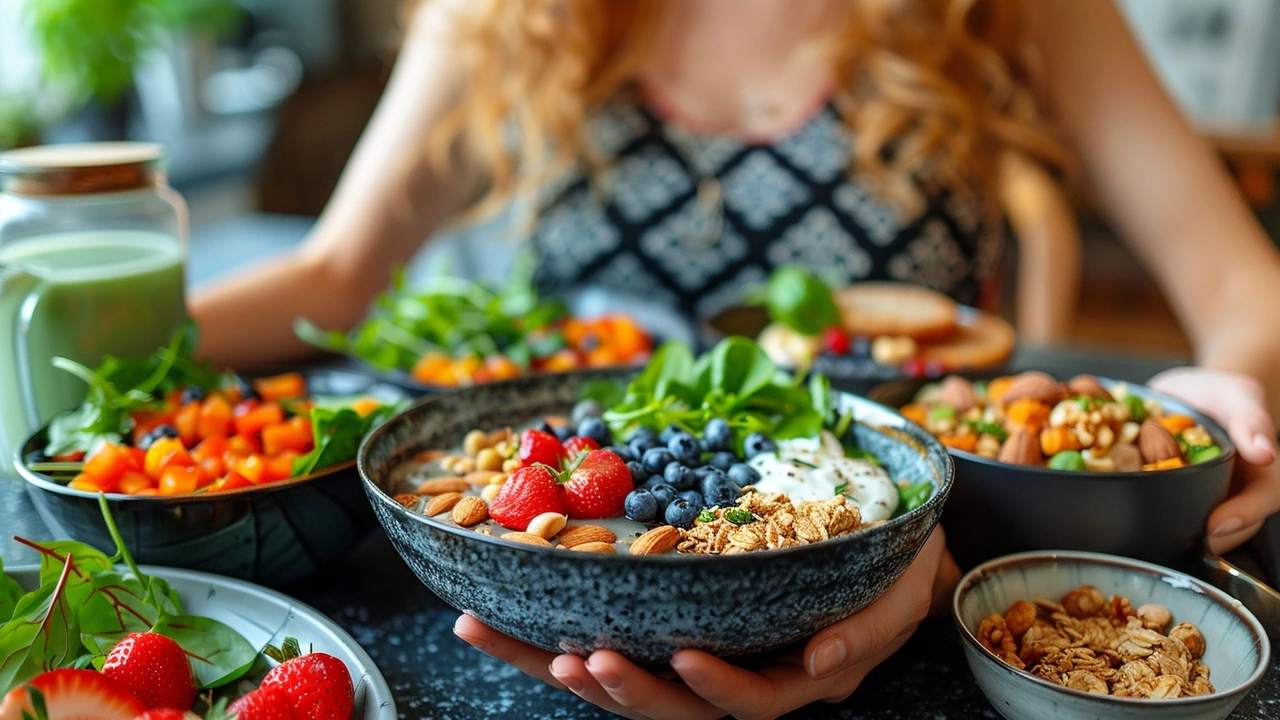Starting the day with a well-balanced breakfast is crucial for athletes to achieve peak performance and maintain optimum health. The right breakfast can provide energy, improve concentration, and aid in muscle recovery.
Let's explore various healthy breakfast options specifically tailored for athletes. These ideas are easy to prepare and full of nutrients to kickstart your day on a high note.
- The Importance of Breakfast for Athletes
- Quick and Nutritious Smoothie Bowls
- Protein-Rich Breakfast Options
- Energizing Whole Grains and Fruits
- Hydration Tips to Start the Day
The Importance of Breakfast for Athletes
Breakfast is often hailed as the most important meal of the day, and for athletes, this rings especially true. When you sleep, your body continues to use up energy to support vital functions, leaving your glycogen stores depleted by morning. Without refueling, athletes may find themselves running on empty, which can severely impact their performance and recovery.
One of the key reasons breakfast is crucial for athletes is its role in restoring glycogen levels. Glycogen is the storage form of glucose and serves as a primary energy source during intense physical activities. Consuming a balanced breakfast that includes carbohydrates helps replenish these stores and provides the energy needed for training or competitions. Failing to do so can lead to early fatigue and reduced endurance.
In addition to energy levels, breakfast also plays a significant role in muscle recovery and immune function. Including protein in your morning meal aids in muscle repair by supplying amino acids essential for building and maintaining muscle tissues. This is particularly important after strenuous workouts or training sessions. Vitamins and minerals found in fruits, vegetables, and whole grains boost the immune system, keeping athletes healthy and reducing the risk of injuries or illnesses.
Studies have shown that skipping breakfast can negatively affect cognitive functions such as memory, attention, and decision-making. For athletes, sharp mental skills are just as important as physical prowess. A well-balanced breakfast helps improve concentration and reaction times, which can make a significant difference during high-pressure situations in sports.
Another benefit of having breakfast is the positive impact on metabolism. Eating in the morning kickstarts the body's metabolic processes, allowing for better calorie burning throughout the day. This is especially useful for athletes who need to manage their weight and body composition efficiently.
According to a study published in the Journal of the International Society of Sports Nutrition, athletes who consume breakfast before training sessions exhibit higher levels of performance and endurance compared to those who skip it. The study emphasized the importance of a nutrient-dense meal in the morning for optimal results.
Furthermore, having a consistent breakfast routine helps establish healthy eating habits and provides a structured start to the day. This discipline can translate to other areas of an athlete's life, promoting overall well-being and success in their sports endeavors. Athletes who prioritize breakfast often enjoy more stable energy levels and find it easier to maintain a balanced diet throughout the day.
Ultimately, breakfast is not just about fueling the body but also about setting a positive tone for the day ahead. For athletes aiming to reach their full potential, investing in a nutritious morning meal can yield significant benefits for both their physical and mental performance.
Quick and Nutritious Smoothie Bowls
When you need a fast yet nutritious breakfast, smoothie bowls are a fantastic option. These vibrant, colorful meals are easy to make and can be packed with all the nutrients an athlete needs. A proper blend of fruits, vegetables, protein, and healthy fats ensures you get a balance of vitamins, minerals, and energy to start your day.
One of the best aspects of smoothie bowls is their versatility. You can customize them based on your preferences and seasonal produce. Start with a base of frozen fruit - bananas, berries, mangoes, and pineapples are all great choices. Adding frozen fruit not only enhances the taste but also gives the smoothie bowl a thick, creamy texture.
To pack in some extra nutrition, add a handful of greens like spinach or kale. These leafy greens are rich in iron and vitamins that help with muscle function and recovery. Also, incorporating a protein source is crucial. A scoop of protein powder, a dollop of Greek yogurt, or a handful of nuts can provide the necessary protein for muscle repair and growth.
Don't forget to include some healthy fats. Avocado, chia seeds, or flaxseeds are excellent options. Healthy fats are essential for brain function and can keep you feeling full longer. Pour your blend into a bowl and get creative with the toppings. Fresh fruit slices, granola, coconut flakes, and a drizzle of honey can add both flavor and texture.
“Consuming a mix of macronutrients in the morning can significantly improve an athlete’s performance throughout the day,” says Dr. Simone Nichols, a sports nutritionist.
By starting your day with a nutrient-dense smoothie bowl, you’re ensuring not just physical energy but also mental clarity.
Here are some quick recipes to get you started:
Berry Blast Smoothie Bowl
- Ingredients: 1 banana, 1 cup mixed berries, 1/2 cup Greek yogurt, Handful of spinach, 1 tbsp chia seeds, 1/2 cup almond milk
- Directions: Blend all ingredients until smooth. Pour into a bowl and top with granola, fresh berries, and a drizzle of honey.
Tropical Delight Smoothie Bowl
- Ingredients: 1 cup mango, 1/2 cup pineapple, 1/2 avocado, 1 scoop protein powder, 1/2 cup coconut milk
- Directions: Blend all ingredients until smooth. Pour into a bowl and top with shredded coconut, slices of kiwi, and a handful of nuts.
These recipes are just starting points. Feel free to mix and match your favorites. Remember, the key to a successful smoothie bowl is balance. Combining fruits and vegetables with proteins and fats ensures that you kick off your day with a meal that's not just delicious but also sustaining and effective at fueling your morning training or workout.

Protein-Rich Breakfast Options
When it comes to fueling an athlete's body, protein is an essential component. It's not just important for muscle growth and repair but also plays a critical role in overall performance and recovery. Including protein-rich foods in your breakfast can help ensure you're getting the right nutrients to support your training regimen.
A great option is the classic scrambled eggs. Eggs are a powerhouse of protein, with each egg providing about 6 grams. For an added twist, you can mix in some spinach, tomatoes, and a sprinkle of cheese. Not only does this boost the protein content, but it also adds vitamins and minerals essential for energy and immunity.
Another fantastic choice is Greek yogurt. It's packed with protein, approximately 10 grams per 100 grams serving. Top it with some fresh berries, a drizzle of honey, and a handful of nuts or seeds for an energy-boosting meal. Greek yogurt also contains probiotics, which are beneficial for gut health, ensuring that your digestive system works efficiently, aiding nutrient absorption.
If you prefer something warm and hearty, consider a bowl of quinoa porridge. Quinoa is often dubbed a superfood because of its high protein content, containing all nine essential amino acids. By cooking it with milk or a plant-based alternative and adding a pinch of cinnamon and some sliced bananas, you create a delicious and satisfying breakfast that keeps you full longer.
Chia seeds are another excellent source of protein. You can prepare chia pudding by soaking chia seeds in milk overnight. In the morning, mix in some vanilla extract and top with your favorite fruits. This not only gives you a protein boost but also a good dose of omega-3 fatty acids, which are great for reducing inflammation and aiding recovery post-exercise.
Protein shakes are a quick and convenient option. Mixing a scoop of protein powder with water or milk, and tossing in some spinach, banana, and almond butter, makes for a nutritionally balanced drink. This can be particularly useful if you're short on time in the morning but still want to ensure you're getting quality nutrients.
For those who crave something savory, smoked salmon on whole grain toast is an incredible choice. Salmon is rich in protein and omega-3 fatty acids. You can add some avocado and a poached egg for an extra nutrient kick. This combination provides long-lasting energy, perfect for a strenuous workout or a busy day ahead.
Resistance exercise enthusiasts can benefit greatly from including cottage cheese in their morning routine, as it is another protein-rich food. A bowl of cottage cheese with sliced pineapples or a sprinkle of nuts can be both delicious and filling. Cottage cheese is also rich in casein, a slow-digesting protein, which helps in maintaining muscle mass throughout the day.
According to the Australian Institute of Sport, “Athletes should aim to include a source of protein in each meal to support training adaptations and promote recovery.” Their guidelines emphasize incorporating foods like eggs, fish, dairy, and legumes as practical protein sources.
It's important to keep variety in your diet to ensure you're getting a wide range of nutrients. So, mixing up these protein-rich breakfast options can not only meet your protein needs but also keep your breakfast exciting and delicious. Experiment with these ideas and find what works best for you to keep you energized and ready to tackle your training sessions.
Energizing Whole Grains and Fruits
When it comes to providing energy for athletes, whole grains and fruits are an impeccable combination. Whole grains like oats, quinoa, and whole wheat provide complex carbohydrates, which are an essential source of continuous energy. Unlike simple carbs, which cause a quick spike and fall in blood sugar levels, complex carbs digest slowly and steadily, providing sustained energy throughout the morning.
Starting your day with whole grain options can enhance your performance significantly. For instance, oatmeal topped with fresh fruits is not only a delightful breakfast but packs a punch of fiber, vitamins, and antioxidants. Fiber is key in keeping you full longer, which can be really beneficial during long training sessions or competitions.
Benefits of Whole Grains
Whole grains such as brown rice, barley, and buckwheat are rich in essential nutrients like B vitamins, iron, magnesium, and selenium. These nutrients help your body convert food into energy, maintain healthy oxygen levels in blood, and support muscle function. A study conducted by the Harvard School of Public Health found that regularly consuming whole grains reduces the risk of chronic diseases.
Harvard Nutritionist Lisa Moskovitz explains, "Whole grains offer more nutrients and fiber, making them a healthier and more sustaining food choice for athletes."
Powerful Fruits for Athletes
Adding fruits to your breakfast not only enhances the flavor but also increases nutritional value. Bananas, for example, are rich in potassium, which helps prevent muscle cramps. Berries like strawberries, blueberries, and raspberries are packed with antioxidants that help in reducing inflammation and muscle soreness.
Let's not forget apples, which are a great source of vitamin C and fiber, perfect for a mid-morning snack or even as part of a hearty breakfast. A balanced combination of whole grains and fruits ensures that your body gets a variety of nutrients, which is vital for overall health and optimal performance.
Quick Breakfast Ideas
It’s understandable that athletes often have tight schedules. Here are a few quick and nutritious breakfast ideas that incorporate energizing whole grains and fruits:
- Oatmeal with Fresh Berries: Cook oats with milk or a dairy-free alternative and top with fresh berries, a drizzle of honey, and a sprinkle of nuts for added crunch.
- Quinoa Breakfast Bowl: Prepare quinoa and mix with chopped apples, walnuts, cinnamon, and a dollop of Greek yogurt.
- Whole Grain Toast with Avocado and Fruit: Toast a slice of whole-grain bread, spread avocado over it, and serve with a side of sliced bananas or berries.

Hydration Tips to Start the Day
Staying well-hydrated is essential for athletes, and it's vital to make hydration a priority from the moment you wake up. Proper hydration helps in maintaining muscle function, regulating body temperature, and ensuring that nutrients are transported throughout the body effectively. To start your day on the right foot, here are some hydration tips tailored for an athlete's needs.
First and foremost, drinking a glass of water when you wake up is a great habit to form. After hours of sleep, your body is naturally dehydrated, and replenishing fluids right away can help kickstart your metabolism and wake up your organs. A good rule of thumb is to drink at least 250-300ml of water.
Incorporating electrolytes into your morning hydration routine can also be highly beneficial. Electrolytes help to maintain fluid balance, prevent cramps, and sustain energy levels. You can add a pinch of salt and a dash of lemon juice to your water or opt for a natural electrolyte drink such as coconut water. This practice is especially important after a vigorous morning workout.
Another engaging way to stay hydrated in the morning is by consuming foods with high water content. Fresh fruits like watermelon, oranges, and strawberries not only provide essential vitamins and nutrients but also contribute significantly to your daily fluid intake. Including these fruits in your breakfast or as a side snack can be both refreshing and hydrating.
“Water is the driving force of all nature,” Leonardo da Vinci eloquently stated, highlighting the undeniable importance of hydration in our daily lives. For athletes, this holds especially true.
While water is essential, it is equally important not to rely solely on it. Including a variety of hydrating liquids such as herbal teas or low-sugar sports drinks can add variety and additional benefits. Herbal teas like chamomile or peppermint can have calming effects, reducing any morning workout-induced muscle stiffness.
Avoiding diuretics such as coffee and certain caffeinated drinks can also make a significant difference. While a coffee boost might be tempting, it can lead to increased urination and potential dehydration. If you must have coffee, balance it out with extra water intake.
Monitoring your hydration levels can be made easy by observing the color of your urine. Light yellow indicates proper hydration, while darker shades may suggest the need for more fluids. Keep a reusable bottle handy throughout the day as a tangible reminder to drink regularly.
Hydration is not just about the morning routine. Make it a holistic practice by staying consistently hydrated throughout the day. Carrying a water bottle, setting reminders, or using hydration apps can help achieve this goal. Remember, maintaining hydration is key for optimal athletic performance and recovery.






